If you’re struggling to find remedies for treatment-resistant depression, SunCloud Health is here to help. Transcranial Magnetic Stimulation, or TMS, is a breakthrough treatment offering solutions for those who may have exhausted all other options.
We’re proud to provide TMS therapy in the comfort and privacy of our Northbrook, Illinois, office, convenient to Chicago and the north suburbs. Let us help you learn more about what TMS can do for you and how you can experience lasting relief.
The quickest way to get answers to your questions is to call us directly at (847) 348-8264 or email us at InterventionalPsychiatry@SunCloudHealth.com
- It’s comfortable. Most people feel only a light tapping sensation during TMS treatments.
- It’s non-invasive. The magnetic device works outside the body to target one area of the brain.
- It’s anesthesia-free. Clients are fully awake in each session, under the care of a TMS therapist.
- It’s effective. TMS has been shown to help 50% to 60% of people with severe treatment-resistant depression.
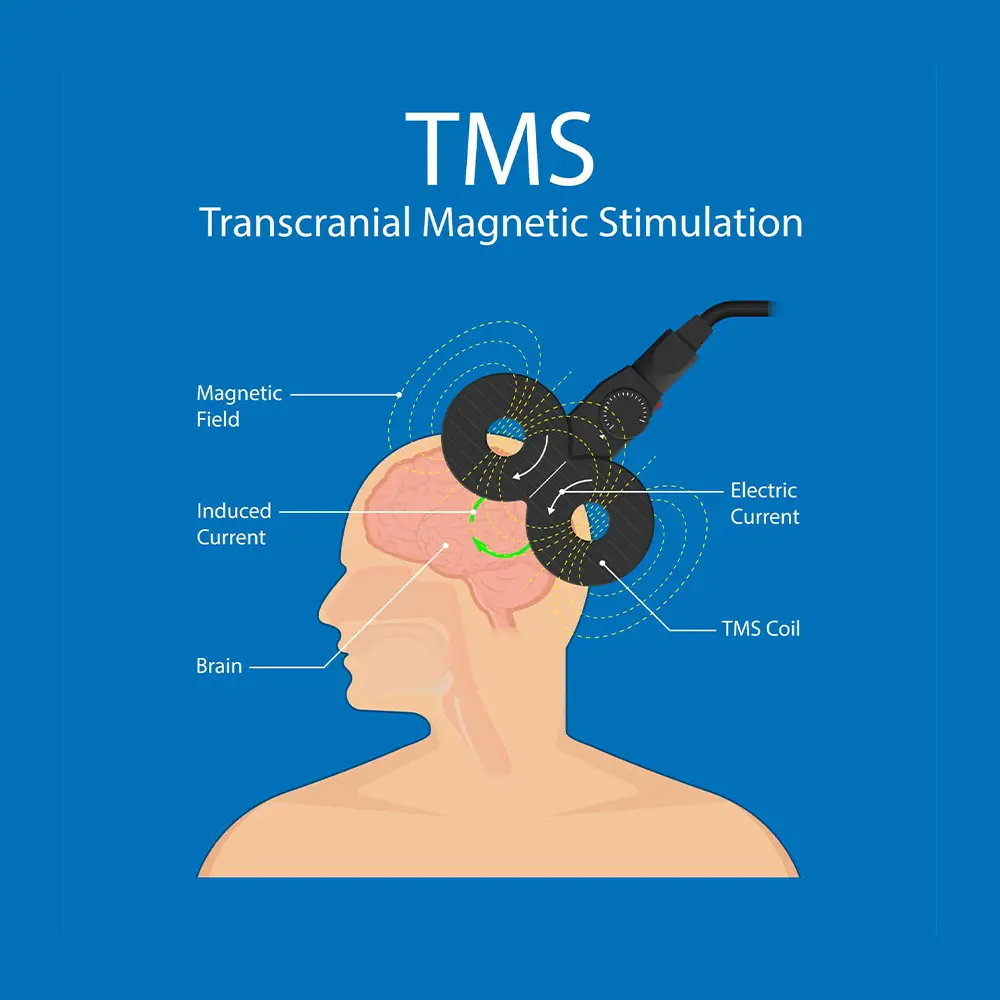
A transformative treatment for depression
Depression is the #1 cause of disability in the U.S. for people aged 15 to 44 – and if you suffer from it, you know how it can steal the energy, motivation, and clear thinking you need to navigate everyday challenges and simply enjoy life.
Originally developed to treat severe depression resistant to other therapies, TMS therapy is an exciting advancement in care that provides relief when all other treatments have been unsuccessful, and with only mild side effects. In fact, studies have shown that TMS treatment for depression can relieve symptoms such as restlessness, sleep loss, irritability, shortness of breath, muscle tension, problems with concentration, and more.
DR. ANANDAPPA ON TMS AND ESKETAMINE FOR TREATMENT-RESISTANT DEPRESSION: NOT ALLOWED TO DIE PODCAST
How TMS therapy works
In patients experiencing severe depression, electrical activity in certain areas of the brain is reduced. Transcranial Magnetic Stimulation is a highly targeted treatment that focuses on sending electrical pulses to those areas that are driving the worst symptoms of depression.
A special electromagnetic coil is placed on the forehead, where it delivers short, repeated signals, or pulses, that stimulate nerve cells in the targeted area. By targeting these areas, the magnetic pulses create an electrical current that stimulates and reawakens affected nerve cells, thereby increasing brain activity and restoring it back to normal levels.
The repeating pulse pattern explains why some experts call this treatment rTMS. The strength of the magnetic field used in TMS treatments is similar to the one used in magnetic resonance imaging (MRI).

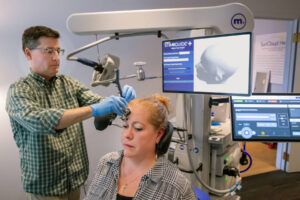
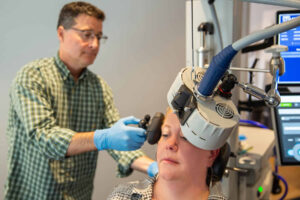
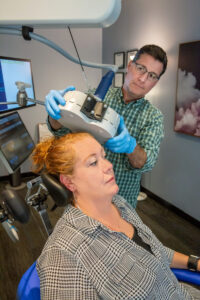
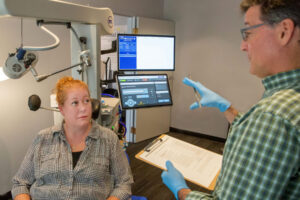
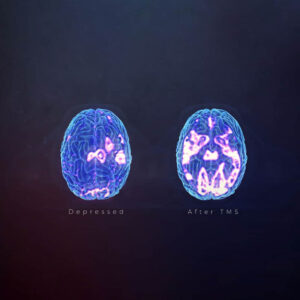
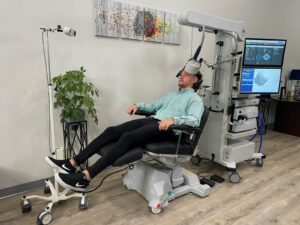
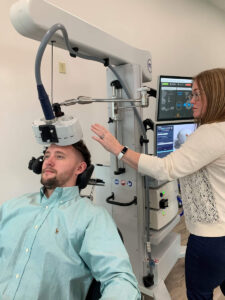
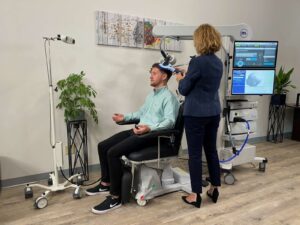
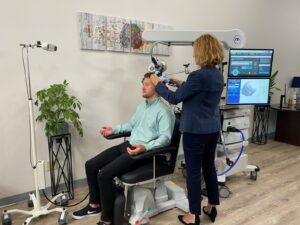
Explore the benefits of TMS treatment
Who is a good candidate for TMS therapy?
Many people feel depressed from time to time, but some experience chronic, life-changing depression that experts say may relate to abnormalities in a specific area of the brain known as the prefrontal cortex. Transcranial Magnetic Stimulation is typically prescribed to adult patients when antidepressants haven’t worked, or the side effects are intolerable.
Other indications for TMS may include lack of progress with talk therapy, or poor experiences with treatments like Electroconvulsive Therapy (ECT), also known as “shock therapy,” which resulted in fuzzy thinking or memory loss.
If your medication isn’t working or has unpleasant side effects, current treatment isn’t working, or therapy has helped a bit though you don’t feel like your old self yet, you may be a candidate for TMS. Contact the team at SunCloud Health to discuss your options or learn more about TMS treatment for depression.
What type of depression does TMS treat?
Transcranial magnetic stimulation is an FDA-approved treatment used for patients with severe major depressive disorder, or treatment-resistant depression.
What defines treatment-resistant depression?
Treatment-Resistant Depression, or TRD, refers to a depressive disorder not responding to talk therapy or medication. Antidepressant medications don’t work for everyone. In fact, ⅔ of people don’t get adequate relief from the first one they try, and switching medications doesn’t always help. Similarly, patients may have experienced unpleasant side effects from other forms of therapy while also not addressing the core problem. TMS is a severe depression treatment offering a non-invasive approach to therapy when all other avenues have failed.
Who provides TMS therapy near me?
At SunCloud Health, we see you as more than just your diagnosis – and we’re committed to your long-term healing and progress. Our TMS therapists are located at our Residential Treatment Center at 1535 Lake Cook Road in Northbrook, IL. Contact us at (847) 348-8264 to schedule a consultation.
What should I expect during a transcranial magnetic stimulation procedure?
Most TMS treatments last between 20 and 60 minutes, with patients remaining awake throughout the procedure. The SunCloud Health care team will help you get comfortable and your TMS therapist will stay with you throughout your session.
TMS therapy gains effectiveness over a series of sessions rather than taking effect all at once. Your care team will talk with you about the number of sessions recommended and the best schedule to follow. We then coordinate with your primary care physician and other health providers as needed to deliver quality care that addresses your individual needs.
What are the possible side effects of TMS?
One of the greatest benefits of TMS for treatment-resistant depression is the low risk for side effects. When compared with medications, shock treatment, and other standard therapies often used for depression and other mental health conditions, transcranial Magnetic Stimulation has few if any troubling side effects. They might include:
- Tingling or muscle contractions during the procedure
- Mild headaches or brief light-headedness
- Slight discomfort near where the magnetic device is placed
Seizures are possible, but two large-scale studies revealed no incidents of seizures during TMS treatment. When compared with medications, shock treatment, and other standard therapies often used for depression and other mental health conditions, TMS has few if any troubling side effects.
Schedule your first session now
Explaining SunCloud’s Integrated Model Why is an integrated treatment model essential to successfully treating patients?
Dr. Kim Dennis, Co-Founder and Medical Director at SunCloud Health, discusses the vital role the integrated model (that she is pioneering at SunCloud Health) plays in the success of treating patients with co-occurring disorders and underlying trauma. How does SunCloud create an authentic culture of patient support?
